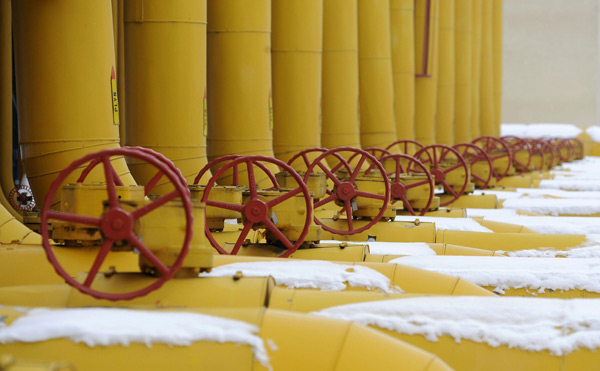
Ukraine Rejects Russia’s $7 Billion Claim for Unused Gas
Publication: Eurasia Daily Monitor Volume: 10 Issue: 25
By:

Ukraine has rejected Russia’s demand that it pay a fine for taking less Russian gas from pipelines last year than stipulated by contracts. Kyiv’s position is that the contracts, which it considers damaging to Ukraine, should long ago have been revised. Gazprom can now sue the national oil and gas company Naftohaz Ukrainy in an international court. Kyiv has apparently hoped for sympathy from the European Union, but none has materialized. The Ukrainian government may use this as a pretext to accept Russia’s offers of cheap gas in exchange for quitting the European Energy Community, if not joining the Russian-dominated Customs Union.
On January 26, media outlets reported that Gazprom wants Naftohaz to pay an additional $7 billion for gas deliveries in 2012 as punishment for buying less gas than stipulated by the ten-year contract signed in January 2009 by the government of the then Ukrainian Prime Minister Yulia Tymoshenko. According to the contract, Naftohaz has to purchase 41.6–52.0 billion cubic meters (bcm) of gas each year. However, Naftohaz pumped only 24.9 bcm of gas from Russia last year (Kommersant-Ukraine, January 28). According to a take-or-pay clause in the contract, Gazprom wants Naftohaz to pay for the gas Naftohaz was supposed to take but did not.
Kyiv argues that Gazprom, as the contract requires, had been warned in advance that Naftohaz would import less gas than stipulated by the contract. However, Gazprom argues that although warned, it insisted that Naftohaz should abide by the contract (Kommersant-Ukraine, January 31). Kyiv apparently believes it will not lose to Gazprom in court, as Gazprom has already lost price disputes on the same issue to several customers from Europe. President Viktor Yanukovych said on a recent visit to Lithuania that Gazprom’s claims were unfair and that the take-or-pay clause in the contract worked against free market principles. He reiterated the claim that Gazprom’s prices for Ukraine have been unfair (Interfax-Ukraine, February 6). Kyiv has been asking Moscow for several years to revise the contract, as Ukraine pays more for Gazprom’s gas than most of its neighbors. But talks have thus far been fruitless.
Yanukovych also used the occasion to lambaste the European Union for not taking Ukraine’s side in its fresh gas dispute with Russia, just like in 2009 when Tymoshenko accepted the unfavorable contract under pressure from the EU, which was affected by Russian gas cuts. Yanukovych complained that the European Energy Community ignored Ukraine’s interests, having offered no support for Ukraine in the current dispute, while members of the Energy Community support Russia’s South Stream gas pipeline bypassing Ukraine (UNIAN, February 6).
Ukraine joined the Energy Community in 2010 in the hopes that the EU would take its side in disputes with Russia—in particular that Brussels would say “no” to South Stream and take up Ukraine’s invitations to upgrade its own gas pipelines instead. However, this has not happened—not only because Russia has good lobbyists in Europe, but also because Ukraine is in no hurry to reform its gas transportation sector, which remains non-transparent and is thus shunned by potential investors.
Kyiv may use what it perceives as Europe’s inaction as an excuse to quit the Energy Community, just like it has been trying to blackmail the EU into signing an association and free trade agreement via hints that Ukraine might prefer the Customs Union. Russia has offered Ukraine cheap gas and assistance in upgrading its pipelines in exchange for Kyiv freezing its European integration plans. In particular, Russian Ambassador Mikhail Zurabov said last fall that Ukraine’s membership in the Energy Community was one of the obstacles to establishing a consortium to manage Ukraine’s gas pipelines jointly with Gazprom (Interfax-Ukraine, October 29, 2013).
Cheaper Russian gas could in theory help Ukraine secure funding from the International Monetary Fund (IMF) whose mission arrived in Kyiv on January 29 to check whether Ukraine qualifies for a $15 billion loan (Interfax-Ukraine, January 14). The IMF did not lend anything to Ukraine in 2011–2012 because the government went back on its promise to hike domestic gas prices in order to reduce the deficit of the state-controlled Naftohaz. Kyiv argues that Ukrainian households cannot afford Russian gas that costs $430 per 1,000 square meters, so prices are subsidized for all households. If Russia cut gas prices substantially, Kyiv would be able to remove those subsidies and keep its promise to the IMF. For comparison, Gazprom’s price for neighboring Belarus, which ceded its gas pipelines to Russia, equaled $166 last year (https://www.btg.by/index/newsbyid/id/138).
Meanwhile, new agreements with Russia are reportedly taking shape, but ones that exclude the EU. Citing its sources in the Ukrainian energy ministry and Gazprom, the Ukrainian edition of the Russian daily Kommersant reported on February 11 that Kyiv and Moscow last week started talks to set up a bilateral consortium to manage and upgrade Ukraine’s pipelines. Until recently, Ukraine insisted on a trilateral consortium involving the EU. The new talks had been prompted by the EU’s reluctance to finance the upgrade, said the sources. What is clear from these developments is that Russia will not lose an opportunity to use Gazprom’s $7 billion claim against Naftohaz as an element of pressure in any talks with Ukraine.




